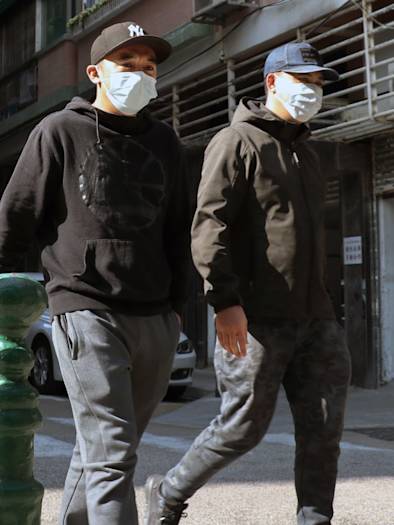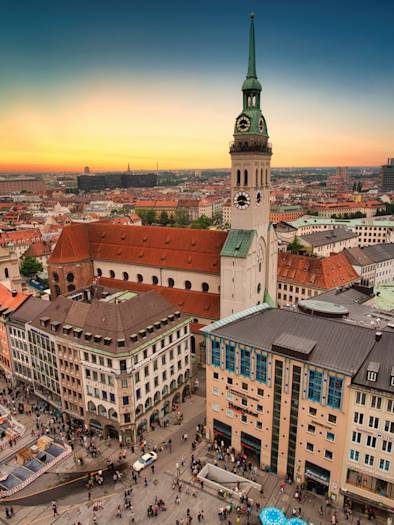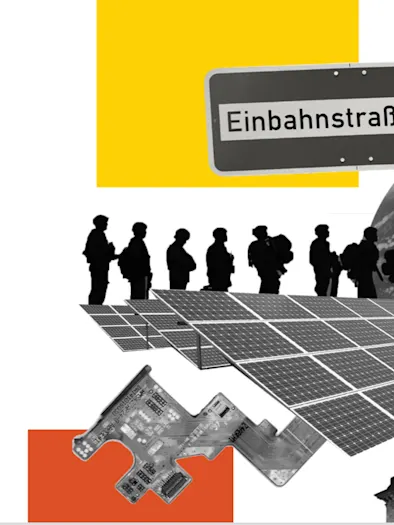
Zeitenwende (Turn of an Era) – The First 100 Days of Germany’s New Governing Coalition
When Germany’s new federal government took office on December 8, 2021, there was much talk of change and transformation. 100 days have passed since then and a transformation has indeed taken place. However, a completely different one than the representatives of the so-called “traffic light” coalition (based on the three parties’ colors) had imagined. So different, in fact, that Chancellor Olaf Scholz has already coined a new term Zeitenwende – turn of an era. The Russian invasion of Ukraine has overturned perhaps permanently a whole series of fundamental convictions of German politics, many of which had been held for many years.
A Resounding Shock
“Change through trade” – this axiom of (West) German foreign policy shaped its dealings with the Soviet Union and later the Russian Federation for decades. Always remaining in dialog, ensuring fruitful economic relations and maintaining intensive energy relations – these were the principles to which the various governments of West Germany and later of united Germany have adhered to fundamentally since the 1970s. This policy was very successful for decades. So successful, in fact, that aggression by Russia of the kind seen in Ukraine since February 24, no longer seemed conceivable. The warning signals of the past years (Chechnya, Georgia, Crimea, Donbas) were noted but did not result in a fundamental adjustment of policy. At the end of the day, it seemed obvious that the Russian leadership would refrain from an even greater aggression. In the eyes of the German governments, the rationale against such action – quite apart from moral aspects – seemed absolutely clear. The same was true of numerous German intellectuals, diplomats, and journalists. Many representatives of this guild still declared such a development to be very unlikely, if not almost impossible, until immediately before the start of the Russian invasion.
A New Reality Is Taking Hold
The pandemic and climate change were the defining topics of public discourse in recent years. The elites of German society had predominantly become accustomed to seeing a rule-based international order as the normal case, or at the very least to taking little interest in foreign and security policy. Pronounced wishful thinking certainly played a major role in this. Ultimately, it was a world that, on the whole, actually functioned well from the German point of view – and from which the export-strong German economy profited. A pronounced pacifism in public opinion, an indifferent if not rejecting attitude towards the military (with strong arms exports at the same time, which, however, took place largely below the radar screen of public perception) and a strong orientation towards economic relations were different sides of the same coin. All in all, and despite the crises of the past years, it was possible to live very comfortably. The German model worked.
All That Is in the Past
The Russian attack on Ukraine that began on February 24, changed all of that in a radical way. The German model described above – despite decades of success – can no longer be justified and sustained in the face of the current situation.
A Look at the Key Players
Chancellor Olaf Scholz was long perceived as hesitant and ambiguous. However, it was he who coined the word Zeitenwende in his speech in the Bundestag on February 27 and struck a completely new tone towards Russia and Putin. In his speech, which has already been described as “historic”, he made it clear that he is not concerned with gradual changes, not preoccupied only with spending a bit more on defense, but with a new state of affairs, and a new positioning of Germany in international politics.
Robert Habeck, “super-minister” for economic affairs and climate protection, meanwhile shows himself to be a pragmatic Realpolitiker who does not hesitate to remove or at least question a whole series of ideological fixed points of his party, the Greens. These issues include the lifetimes of Germany’s remaining nuclear power plants as well as domestic coal production.
Annalena Baerbock – initially referred to as “our young foreign minister” by some commentators in a well-meaning but also somewhat condescending manner – has so far done her difficult job surprisingly well, in the opinion of many observers.
Christian Lindner, the finance minister from the traditionally fiscally conservative FDP, had taken office with the intention of countering overly utopian ideas of his Green and Social Democratic coalition partners with fiscal restraint. However, it is already foreseeable that under his leadership as finance minister Germany will have to incur record debts in the coming years in order to implement the various promised commitments.
Meanwhile, the pandemic has become a marginal topic in the media, despite a sharp rise in the number of infections. Everything is overshadowed by the war in Ukraine. Increasingly, the consequences are also coming into focus, especially the question of how to deal with the large number of Ukrainian refugees.
Political Implications
Any interim assessment of the first 100 days of the new federal government must inevitably focus on the one issue that dominates everything else, the Russian attack on Ukraine. This is not to suggest that day-to-day policy debates and agendas in individual policy fields have all been put on hold. However, they are currently receiving little attention in the media and the public and many of them – even if not directly linked to foreign affairs – are being impacted by the international crisis. Budgets are being revised, relations to Russia are being reconsidered and, in many cases, discontinued. To name but one example, the Federal Ministry of Education and Research has frozen cooperation and scientific exchange with Russia.
In the following, we take a look at those policy areas that are currently the focus of particular attention:
Foreign Affairs and Defense
Published in November 2021, the coalition agreement between the Social Democrats, the Greens and the FDP already suggests a more robust foreign and security policy and a more critical stance vis-à-vis Russia and China (“systemic rivalry”). It specifically mentions the government’s commitment to support for Ukraine, while pursuing “substantial and stable” relations with Russia and a continued readiness for “constructive dialog”. The document talks about a reduction of European dependency in strategic areas, including energy supplies, refers to a “value-based” foreign policy (peace, freedom, human rights, democracy, rule of law, sustainability) as well as a consistent climate policy in the sense of the European Green Deal, the 2030 Agenda and the Paris Climate Agreement.
So, while some key elements of the new government’s future foreign policy were already recognizable, it must still be said that the Russian war of aggression on Ukraine has been a game-changer.
During the 16 years of Chancellor Merkel’s leadership, Germany publicly emphasized the Franco-German and transatlantic partnerships as the cornerstones of its security framework but did little to fulfill its pledge to NATO. While criticism towards Germany’s lack of willingness to increase its military spending was loudest under the Trump administration, this was nothing new as his predecessor, Barack Obama, had also reminded Germany of its NATO obligations on several occasions.
Over many years, Germany’s armed forces, the Bundeswehr, has been subject to budget cuts (“peace dividend”), debates about its role, and an evaporation of support – both from policymakers as well as the general public. Attempts at reform failed.
This has left the Bundeswehr underfunded, ill-equipped and understaffed. Under the shellshock of Russia’s actions, the new German government has now taken a sharp turn. In a speech before parliament on February 27, only three days after the start of the Russian invasion, Chancellor Scholz announced a massive spending increase for defense, with the intention to enable the military to move forward with key procurement and modernization projects:
A dedicated extra budget of 100 billion euros to be allocated to defense.
The annual defense budget is to be increased beyond 2 percent of the GDP.
The federal government has also hinted that reforms of procurement guidelines and processes will be implemented to ensure that much needed projects are not bogged down by administrative and procurement problems.
There also seems to be a new preference within the administration to choose existing over complex custom solutions. The replacement of the aging fleet of Tornado fighter jets can be singled out as a case study of the paradigm shift:
While the need to select a successor to the Tornado has been obvious for years, the replacement was delayed again and again for various reasons and motives by participants from different political camps – motives often based on political rather than military capability considerations.
This complex mélange was swept away by Scholz’ announcement and within days after his speech in parliament, leaks from the Ministry of Defense suggested that Germany would replace Tornado jets with a mixture of the American F-35 jets – the system that experts and the Luftwaffe itself had deemed most suitable in the first place – and a modified version of the Eurofighter for electronic warfare (as a concession to domestic industry demands).
Other projects that are expected to move forward quickly under the new paradigm are a modernization of the PATRIOT air defense system (rather than developing a completely new system in the form of TLVS) or the procurement of a much-needed heavy lift helicopter (either Chinook or the CH-53k). There is even a proposal on the table to reactivate and modernize the mothballed Gepard (Cheetah) anti-aircraft tank – a system phased out years ago at the Bundeswehr for cost reasons and sold at bargain prices to Romania – which is now considered a key asset in protecting NATO troops in Eastern Europe against threats from Russian UAVs and guided missiles.
Several factors need to be taken into consideration when assessing these developments:
Political backing for the massive increase in defense spending might erode over time, depending on the developments in Ukraine and/or domestic political maneuvering.
There is also the risk that highly complex and bloated procurement processes may prevent quick successes, enabling political opponents and industry competitors to bring individual projects to a standstill.
Finally, it remains to be seen to what extent the new leadership of the Ministry of Defense will be successful in reforming the administration’s and the armed forces’ structures, deemed highly ineffective by many observers.
All of this means that securing additional funds is only half the job the new federal government has taken on. The new leadership also needs to draw up and implement a reform program for the armed forces, secure long-term backing from the political parties of the coalition, and – a key element not talked about much at this point in time – the general public, which has been irreverent to the German armed forces for years.
Energy and Climate
In its coalition agreement, the new German government has committed itself to the ambitious goal of achieving climate neutrality as early as 2045 – five years earlier than the European Union’s current target. However, in view of the Russian war in Ukraine and the resulting intention to drastically reduce energy imports from Russia, the primary issue is now once again security of supply.
Germany is still a long way from the goal of climate neutrality. Nor is it likely to be able to achieve the targets set out in the Climate Act 2021. The interim goal for 2030 is to reduce emissions by 65 percent. As things stand, however, only 50 percent will be achieved, and last year emissions actually rose by 4.5 percent.
In January, Robert Habeck, Germany’s Minister of Economic Affairs and Climate Action, presented a comprehensive “Climate Protection Emergency Program” that provides for a massive expansion of renewable energies. The program is divided into an “Easter Package”, the components of which are to be adopted before the summer, and a “Summer Package”, which has not yet been specified in more detail.
The “Easter Package” focuses on:
Discontinuing the renewable energy levy that was introduced more than 20 years ago.
Amendments to acts on renewable energy and energy efficiency, with even more ambitious green energy targets (renewables to cover 80 percent of power production by 2030, faster expansion of onshore and offshore wind power as well as of solar power)
Developing a new heating strategy and overhauling the current hydrogen strategy
The coalition agreement relied heavily on natural gas as an energy source for the transition phase. Coal, on the other hand, was to be phased out by 2030 at the latest.
Russia’s invasion of Ukraine has now not only thrown Germany’s ambitious climate plans off track. The very decisions on how to proceed going forward are now also being called into question. The challenges have once again become much greater.
Energy prices, which had already risen sharply in 2021, have virtually exploded. For the first time in Germany’s history, the price of gasoline is over two euros per liter and the price of natural gas cracked the 200 euros per megawatt hour mark.
Until now, the task of determining future energy policy has been a calculation with the variables of security of supply, environmental compatibility and economic efficiency. In view of the enormously high Russian energy imports to Germany (Russia supplies 55 percent of imported natural gas, 50 percent of coal, and 35 percent of crude oil), the independence factor is now all the more pressing.
Energy policy compromises demanded by civil society and laboriously negotiated between the coalition partners are passé. Certainties on which the plans were based no longer apply. For example, support for the Nord Stream 2 project was first halted in an administrative step and then ended altogether by the U.S. and EU sanctions. It is now being fundamentally questioned whether Russian natural gas should continue to be purchased at all.
That Germany needs an enormous expansion of renewables is – apart from details – widely undisputed. The current situation, however, paradoxically leads to the reemergence of discussions that had long been declared over. Robert Habeck himself no longer rules out the possibility that coal-fired power plants with longer operating times will have to provide the urgently needed base load. Investment plans in LNG infrastructure are being pulled out of the drawers. Even lifetime extensions for German nuclear power plants are no longer an absolute taboo. The Ministry for Economic Affairs and Climate Action recently presented a draft law for mandatory requirements for the stockpiling of natural gas similar to oil reserves.
Habeck justifies these considerations pragmatically by saying that, in case of doubt, security of supply for a functioning and competitive economy and social peace outweighs climate protection. On the one hand, however, this makes the climate targets even more remote. On the other hand, it also makes clear the great importance of increasing energy efficiency and saving energy. This turnaround – so far supported jointly by the coalition partners – could become the next litmus test for society, the party bases of the Social Democrats and the Greens, and ultimately the federal government.
Outlook
In December 2021, Germany’s new federal government embarked on a comprehensive reform program with its coalition agreement “Daring More Progress”. At the moment, all these plans and considerations are dominated and questioned by the shock of the Russian attack on Ukraine. It remains to be seen what new shifts in sentiment and in priorities there will be once large-scale Russian military action in Ukraine ends. A return to the old reality seems impossible – the new reality, however, is only just emerging.







